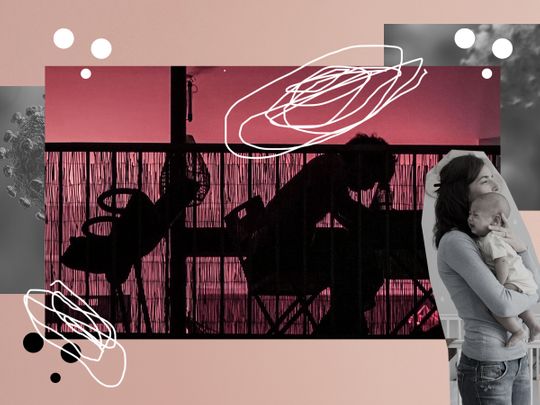
The adjustment to new parenthood can be difficult at any time. We already know that one in five women will experience perinatal anxiety and depression during pregnancy or in the first year after birth, and research shows that women are more likely to suffer from depression or anxiety during pregnancy than at any other time in their lives.
Add a pandemic into that mix - requiring pregnant women to cut themselves off physically from friends, family, work and many of the other communities that we usually rely on to keep spirits up - and it’s no wonder that experts are warning that we could see a rise in pre and postnatal mood disorders.
Siobhan Miller, founder of The Positive Birth Company and author of Practical Ways to Make Your Birth Better, says: “With the coronavirus restrictions in force, we sadly expect the number of women experiencing anxiety and depression during pregnancy or after birth to rise significantly, especially with vital support groups, clinics and classes cancelled, and women often having to give birth alone due to self-isolation and social distancing.”
While everyone is experiencing some form of anxiety and worry about the pandemic, for new parents it adds to the already-stressful situation of having a young baby, says Tanya Dharamshi, Clinical Director and Counselling Psychologist at Priory Wellbeing Centre, Dubai: “Physically, women go through huge hormonal changes post-birth, but there can also be mental challenges too. Common worries include questioning their parenting capabilities, feeling overwhelmed with their new responsibilities and the change in family dynamics, comparing themselves unfavourably to other new parents, and worrying about their appearance, career and finances. We can see already the impact COVID-19 is having on our way of life, the economy and our relationships, which may exacerbate existing mental health conditions, such as post-natal depression. Its impact therefore on parenthood cannot be underestimated.”
What is Perinatal Anxiety?
Perinatal anxiety is described as high levels of anxiety either during pregnancy or in the year after birth, says Siobhan Miller, “which can include constantly worrying about the pregnancy or baby's wellbeing, feeling on-edge, having a sense of dread, difficulty concentrating or racing thoughts, or engaging in behaviours or rituals to try and reduce negative thoughts, such as constantly checking the baby’s breathing throughout the night.”
Dr Vassiliki Simoglou, Psychologist and IVF, infertility, and perinatal issues specialist at Thrive explains: "Women who are currently pregnant have to cope with important health anxieties that they had by no means anticipated: these anxieties mainly include the impact this virus might have on the fetus or themselves, but also on the infant once he/she will be born. Their anxieties might also interfere with their birth plan: Is it going to be safe to go to the hospital? Will they get adequate care when they are there? Will their newborn baby get appropriate screening and care when he/she is born?"
Read our guide to how Covid-19 will affect your birth in the UAE
Dr Simoglou continues: "Social support often helps to temper these anxieties, but with the social distancing recommendations - especially for pregnant women, who are classed as more vulnerable to the virus than non-pregnant women - they are likely to feel more isolated than ever. They worry about not being able to get help from their family members or friends once the baby is born, turning more than ever towards their partner to be reassured."
Social support often helps to temper anxieties, but with the social distancing recommendations, pregnant women might feel more isolated than ever
Then, after birth, Covid-19 related anxieties can exacerbate the fears, worries and concerns a new mother typically experiences, adds Dr Simoglou. "Those worries revolve around the newborn baby’s physical and emotional wellbeing, her ability to look after her baby, and the rollercoaster of her own emotional reactions to the transition into motherhood. The experience of delivery and childbirth can facilitate or complicate this transition, and the surrounding Covid-19 crisis can have a considerable impact on the postpartum period."
How the pandemic can make new mums more vulnerable than ever
There are many reasons why the pandemic could make a new mother even more vulnerable, Dr Simoglou adds: "In the current context of threat to public health and the recommendation of social distancing, a new mother can experience a fear of harming by infecting the baby when she’s too close to him/her.
"She can feel more transparent or unimportant than ever, since everyone around her is now shifting their attention from herself to the newborn baby, worrying about the baby not contracting the virus, much more than they worry about her.
"Feelings of being torn, of something having been ripped off of her with delivery, loss of those feelings of completeness only the state of pregnancy can produce, are emotional states that are usually experienced by new mothers. But under the current circumstances, a new mother can feel even more nostalgic of the pregnancy period, thinking that the newborn is more exposed to this virus than a fetus would be.
"These anxieties about the threat that Covid-19 can represent to her baby and that the scientific community still doesn’t fully understand, instill in the new mother an intense fear of the unknown that can aggravate her feelings of inadequacy and guilt."
During these challenging times, new mothers need all the support they can get from the individuals that are physically or remotely close to her, in the most creative ways, says Dr Simoglou. "It’s important to remember that there are many ways to be close to someone that do not involve physical proximity: staying in touch online with friends and relatives, being able to lean on them for support, can help pregnant women go through this challenging period more smoothly. Above all, they need to be reminded that there is no such thing as a perfect mother. All a mother needs to be is a good enough mother, not perfect neither good, but good enough."
All a mother needs to be is a good enough mother, not perfect, nor good, but good enough
The Positive Birth Company founder Siobhan Miller adds, "It’s hugely important we take greater steps in acknowledging and caring for maternal mental health, and proactively put measures in place to not only support women, but make antenatal and postnatal education more accessible. All too often women suffer in silence and don’t access the help they need, often because they’re afraid to speak out or don’t know where to turn. This needs to change. Becoming a parent is a momentous moment in life, and ensuring it is a positive experience offers long term benefits for mother, baby and the wider family.”
While it may be challenging to seek professional help right now due to self-isolation, if you think you may be experiencing some symptoms of perinatal anxiety or postnatal depression, or that you might be susceptible to it, there are some things you can do. “Hypnobirthing techniques can go a long way in preventing and easing symptoms of antenatal and postnatal anxiety and can easily be completed at home,” says Siobhan Miller. “There’s also a number of free virtual tools, live sessions and Q&As out there enabling you to access expert help even with classes cancelled."
Read more








